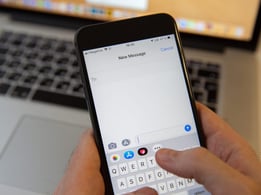
We recently conducted a national survey of 1,000 U.S. adults with smartphones to learn more about people’s communication preferences when being contacted by (or contacting!) a business. We found that people largely prefer companies that offer messaging as a communication channel. In fact, almost two-thirds (63 percent) of respondents would switch to a company that offered text messaging as a communication channel.

Interactive messaging and immediate communication are desired, but the vast majority of consumers (92 percent) expect to wait 5 minutes or more on hold before they speak to a real person. A majority of respondents (90 percent) would prefer to speak with an employee of a company when they have questions, rather than reaching an automated bot or answering service.
Accessibility and communication mean higher returns and greater customer satisfaction for companies. Nearly three-quarters (72 percent) of respondents are more likely to purchase from a shopping site that can communicate with them about their products in real-time, with a real employee, via chat messaging. In fact, they are so enticed by these services that they would even recommend their friends switch to the site (63 percent).
Similar trends were found across all four industries surveyed – respondents would rather schedule their hair care appointments via text (60 percent) and use a financial service that communicated about accounts, bills and payment reminders (65 percent) and over half (60 percent) would switch to brands that offered those services. Consumers would rather book their travel with a company that communicated travel plans, reminders and updates via text message (72 percent) and would switch from the travel company they use to one that offers these services (69 percent). In all four use cases well over half (61 percent) of respondents said they would recommend their friends switch to these companies as well.
Customers are choosing messaging for their communication needs, more than all other formats. Just over 70 percent of respondents would prefer a vacation rental manager texted them with updates and instructions instead of calling, and three quarters (75 percent) prefer a rideshare service text rather than call when they arrived to pick them up.
Three quarters (75 percent) of respondents said they find it helpful to receive texts for appointment reminders. SMS can be extremely useful in certain industries like professionals in healthcare. Other helpful texts include banking alerts (45 percent), travel updates (39 percent), deals and promotions (39 percent) and food delivery updates (36 percent).
Consumers expect personal communication from the companies they are doing business with, yet with scam calls becoming more prevalent than ever, over three-fourths of respondents don’t answer phone calls from anonymous numbers. As younger generations continue to move away from email, it’s never been harder for companies to effectively reach their customers.
So how can businesses communicate with their prospective clients and current customers, without getting lost in voicemail boxes and unopened emails? The survey showed that across all generations over two thirds (69 percent) of respondents would prefer an unfamiliar company to contact them via text rather than a phone call. Unsurprisingly, younger generations (Millennials and Gen Z) more often prefer texting over voice and other forms of communication. In some cases, Gen Z eclipsed Baby Boomers by 20 percent in preferring text over all other forms of communication.
Other Interesting Stats Include:
- A majority (85 percent) of respondents keep their phones within arms reach a majority of the time
- In fact, 38 percent of Millennial respondents always have their phone within arms reach
- Respondents found text message notifications helpful for appointment reminders (76 percent)
- Over half of respondents (61 percent) get uncomfortable when their phone isn’t near them
Avochato promotes dialogue between businesses and consumers by modernizing company communication using today’s preferred methods, with omni-channel capabilities (e.g. SMS, live chat, WhatsApp). The app easily allows consumers to connect with businesses directly, facilitating two-way conversations with real people in real-time.



